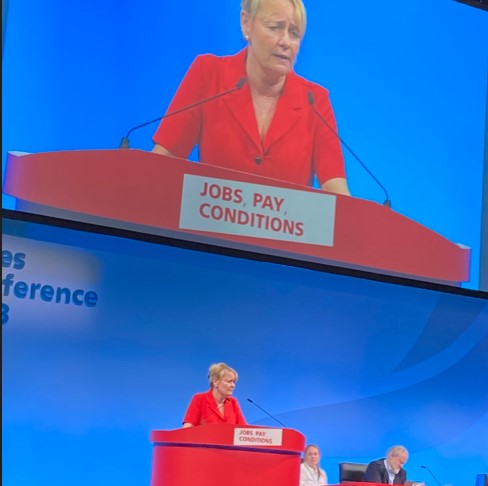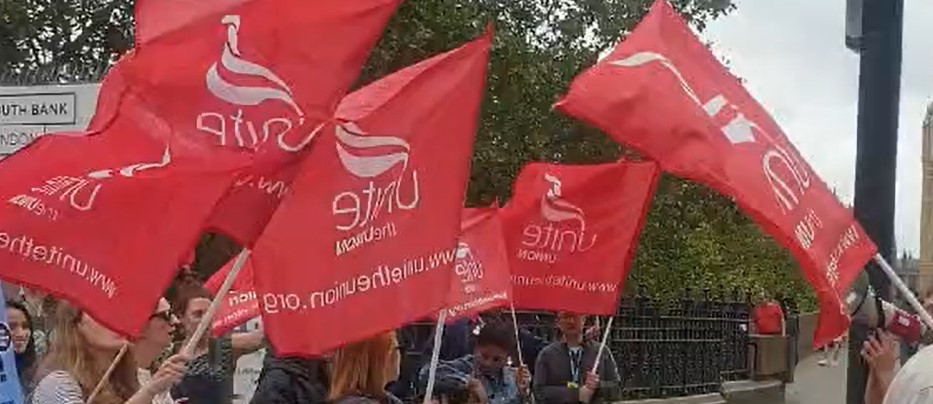By Andy Ford, Unite health delegate.
The debate on the union’s affiliation to the Labour Party was probably the key debate of the Unite conference of 2023. It took place at the Rules Conference held over two days before the Policy Conference.
There was clearly some nervousness within the union leadership about the debate: one of McCluskey’s last acts as General Secretary was to reduce the size of the Rules Conference, to try and avoid the chance of any upsets. But in the event, he needn’t have worried – the amendments calling for branches and regions of the union to be able to support “other parties” got less than 1% support among delegates.
The new General Secretary, Sharon Graham, introduced the debate, urging support for an EC Statement which said:
“The Executive Council opposes amendments 1, 51, 52 and 53 on the grounds that they would have the effect of disaffiliating our union from the Labour Party.
Supporting other political parties or supporting candidates who stand against official Labour candidates would mean automatic expulsion under Labour Party rules.
It is our position that this would not be in the interests of our union at this time – especially so close to an election.”
Unite would find itself expelled
Sharon admitted that the amendments did not directly call for disaffiliation, but correctly said that they would have that effect, because if Unite allowed branches and regions to support other parties, it would find itself expelled from the Labour Party.
In fact, the resolutions were very confused, as they would open up the prospect, say, of some branches in Scotland funding the SNP, while others funded the Labour Party; or else of a few branches funding TUSC or local independents against right wing Labour councils. The union would end up cancelling out its own political expenditure by funding competing organisations!
Sharon pointed out that in the post-2010 period it was Unite donations totalling around £50 million that kept the Labour Party afloat. She said that now was the “…worst time to disaffiliate, just months before an election, when we have poured so much money in to the Party.”
She pointed out that Labour is now organising its manifesto and raised the key policies Unite would be seeking through its affiliation:
• Nationalising energy
• Procurement rules for purchase of locally produced steel
• Devolve employment rights to Scotland and Wales
This last would have a massive effect, gradually making the anti-union laws in England unworkable. She rightly said the Labour leadership would “love it, if we gave up and walked away” and she proposed instead to “hold their feet to the fire”. She argued that the Labour Party should stand up for workers, just like the Tories stand up for big business, and that Unite has the resources and the will to make the Labour leadership make different choices.
She ended rousingly, “We will spine them up. We will call them out. Let’s take Labour back to the workplaces and communities. Replace caution with real action on real issues. Let’s get back to Labour as Labour!”
The subsequent debate was robust, open and fair; a refreshing contrast to some other unions where any motion questioning the link with Labour is ruled out of order. The biggest base in the union in favour of disaffiliation was in the local authorities’ sector, with their experience of often bitter struggles against right-wing Labour councils implementing austerity.
Local authority speakers in the debate called out Labour as witch-hunters, strike breakers, privatisers and liars. All this is true, but the question was what to do about it.
The best speaker for the amendments – and against the EC – was the convenor from a London borough. He pointed out the disparity between Unite’s objectives of wealth redistribution, services provided on the basis of need not the market, and public ownership of the commanding heights of the economy – and what we see served up by the Labour leadership. He pointedly told Sharon, that if she was going hold Starmer’s feet to the fire, to “Try turning the fire on first!”
Another good point was the contrast between the talk of “socialism” at Unite conferences and events, and the failure to take socialism into the Labour Party structures. “We have two parallel worlds: One where we talk about socialism. Then another where we give money to the Labour Party and where there is none of that talk”. Quite true, but it is much more a reflection of the tactics of the Unite political structure than the Labour Party itself.
Numerous speakers supported the EC statement
This delegate ended by saying,“ They do not support us. They do not reflect our values or policies. We need to wise up. When Starmer is elected he will not be looking back at the notes of this Unite conference and saying ‘Hey, here are some good ideas. Let’s do that’ – will he?”

Against that, numerous speakers supported the EC Statement. The Welsh EC member talked about the different political stance of Welsh Labour, and that Wales has always had a Labour majority, but needs a Labour government at Westminster. Terry Renshaw, one of the Shrewsbury pickets, described how he had left Labour in disgust at David Evans, after nearly fifty years membership, but that he would support the EC.
He also picked Sharon up for not once mentioning socialism. “We don’t just want a Labour government; we want a Socialist government”, he declared to applause.
Various NHS workers decried the Labour leadership’s acceptance of a role for the ‘market’ in health (and donations to Shadow Cabinet members’ offices from private health lobbyists), but supported the EC “with reservations”, seeing the need to elect Labour and then push them to stop or reverse NHS privatisation.
A car worker from the East Midlands, supporting the EC, stressed that the choice at the next election is between Tory and Labour, and that at least under a Labour government we have a seat at the table to argue for a Just Transition and green fuels, and his comments were echoed by a Welsh steel worker. “We have had 32 years of the Tories”, he said, “They have destroyed the steel industry. Sharon is looking to the future, maybe the near future. We can rein in the LP. Support the EC!”
A London bus worker described the mountain of anti-union laws built by the Tories and how the only hope of any change is through a Labour government. “Do we really want to walk away and build a whole new party?”, she asked, “We would have nothing on the outside.”
Another London delegate spoke about how the amendments would fragment Unite’s political influence between other parties like the SNP, the Greens and maybe even populist or far right parties, and destroy Unite’s influence in the Labour Party. “And for what?” he asked, “Look at the Greens here in Brighton, just voted out”.
“Labour was founded to be the voice of workers”
One of the most telling contributions was from a rep from the RSPCA. Her members had just been put through ‘fire and rehire’ and in her words “Everything we had organised and fought for was ripped up overnight”. She pointed out that the last Labour government, for all its faults, had established the National Minimum Wage and the Equality Act 2010, “Things we use every day as reps”. She ended, “Labour was founded to be the voice of workers. End fire and rehire. We need our political voice.”
Sharon Graham, in her reply, declared in reply to Terry Renshaw, “I am a socialist. A proud socialist”, and she mocked Keir Starmer’s ‘Five Pledges’ as instantly forgettable. She reminded conference how she had suspended (from Unite) the Labour councillors in Coventry who spent millions to try to break the bin strike in the city, and even stooped to victimising our Unite rep. She promised to spend the Political Fund money on Unite campaigns in the ‘Red Wall’ seats, while maintaining Unite’s affiliation to the Labour Party to secure a say over policy.
“This is not about Keir Starmer. This is a motion for leverage, for using our influence. If we are paying this amount of money then he has to answer our questions. I will keep his feet to the fire in those Red Wall seats.”
It was a democratic debate and everyone who wanted to, managed to speak, and the debate clarified matters greatly. It showed that the idea put forward by some left groups about founding a ‘new worker’s party’ could not survive contact with the real world. The people who spoke against the amendments were not Blairites or careerists; they were experienced union stewards, working class people trying to make a difference for their members.
How will Unite work within Labour’s structures?
The low vote for the amendments, less than a dozen from a hall of hundreds, showed how little traction the idea of a new worker’s party has. What worker would abandon a house infested with rats, move out, and build a new one? Or would they, as practical people, try to deal with the infestation?
Delegates from a range of industries explained that their members need changes in the law – on anti-union laws and ‘fire and rehire’ – and changes in policy – be it in the health service, steel or the automotive industry. They feel that those changes can only come from a Labour government, even under its present repellent leadership.
The problems identified by the local authority delegates, like the union not even “turning the fire on” at Keir Starmer’s feet, are attributable to how Unite operates within the Labour Party structures.
That brings the discussion back to the Unite political structure, its strengths and weaknesses. Unite has the potential to be a huge force for positive, socialist change in the Labour Party and this will be the subject of another article. If Unite is to remain affiliated to the Labour Party, then how does it engage with the Labour Party’s convoluted structures – the NEC, the National Policy Forum (NPF), and the Clause V meeting which will decide the next Labour election manifesto; and which members does Unite allow to be involved in those decisions?



